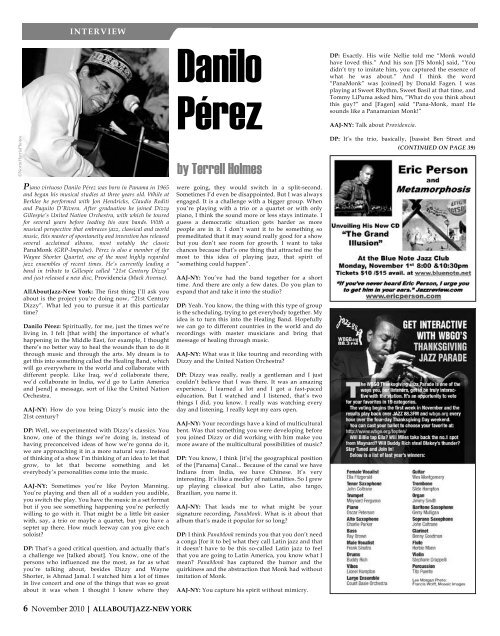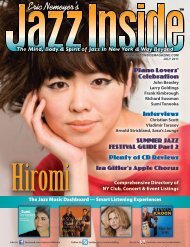AllAboutJazz-New York www.aaj-ny.com - Jazz Singers.com
AllAboutJazz-New York www.aaj-ny.com - Jazz Singers.com
AllAboutJazz-New York www.aaj-ny.com - Jazz Singers.com
You also want an ePaper? Increase the reach of your titles
YUMPU automatically turns print PDFs into web optimized ePapers that Google loves.
©NormHarrisPhotos<br />
INTERVIEW<br />
Piano virtuoso Danilo Pérez was born in Panama in 1965<br />
and began his musical studies at three years old. While at<br />
Berklee he performed with Jon Hendricks, Claudio Roditi<br />
and Paquito D’Rivera. After graduation he joined Dizzy<br />
Gillespie’s United Nation Orchestra, with which he toured<br />
for several years before leading his own bands. With a<br />
musical perspective that embraces jazz, classical and world<br />
music, this master of spontaneity and invention has released<br />
several acclaimed albums, most notably the classic<br />
PanaMonk (GRP-Impulse). Pérez is also a member of the<br />
Wayne Shorter Quartet, one of the most highly regarded<br />
jazz ensembles of recent times. He’s currently leading a<br />
band in tribute to Gillespie called “21st Century Dizzy”<br />
and just released a new disc, Providencia (Mack Avenue).<br />
<strong>AllAbout<strong>Jazz</strong></strong>-<strong>New</strong> <strong>York</strong>: The first thing I’ll ask you<br />
about is the project you’re doing now, “21st Century<br />
Dizzy”. What led you to pursue it at this particular<br />
time?<br />
Danilo Pérez: Spiritually, for me, just the times we’re<br />
living in. I felt [that with] the importance of what’s<br />
happening in the Middle East, for example, I thought<br />
there’s no better way to heal the wounds than to do it<br />
through music and through the arts. My dream is to<br />
get this into something called the Healing Band, which<br />
will go everywhere in the world and collaborate with<br />
different people. Like Iraq, we’d collaborate there,<br />
we’d collaborate in India, we’d go to Latin America<br />
and [send] a message, sort of like the United Nation<br />
Orchestra.<br />
AAJ-NY: How do you bring Dizzy’s music into the<br />
21st century?<br />
DP: Well, we experimented with Dizzy’s classics. You<br />
know, one of the things we’re doing is, instead of<br />
having preconceived ideas of how we’re gonna do it,<br />
we are approaching it in a more natural way. Instead<br />
of thinking of a show I’m thinking of an idea to let that<br />
grow, to let that be<strong>com</strong>e something and let<br />
everybody’s personalities <strong>com</strong>e into the music.<br />
AAJ-NY: Sometimes you’re like Peyton Manning.<br />
You’re playing and then all of a sudden you audible,<br />
you switch the play. You have the music in a set format<br />
but if you see something happening you’re perfectly<br />
willing to go with it. That might be a little bit easier<br />
with, say, a trio or maybe a quartet, but you have a<br />
septet up there. How much leeway can you give each<br />
soloist?<br />
DP: That’s a good critical question, and actually that’s<br />
a challenge we [talked about]. You know, one of the<br />
persons who influenced me the most, as far as what<br />
you’re talking about, besides Dizzy and Wayne<br />
Shorter, is Ahmad Jamal. I watched him a lot of times<br />
in live concert and one of the things that was so great<br />
about it was when I thought I knew where they<br />
6 November 2010 | ALLABOUTJAZZ-NEW YORK<br />
Danilo<br />
Pérez<br />
by Terrell Holmes<br />
were going, they would switch in a split-second.<br />
Sometimes I’d even be disappointed. But I was always<br />
engaged. It is a challenge with a bigger group. When<br />
you’re playing with a trio or a quartet or with only<br />
piano, I think the sound more or less stays intimate. I<br />
guess a democratic situation gets harder as more<br />
people are in it. I don’t want it to be something so<br />
premeditated that it may sound really good for a show<br />
but you don’t see room for growth. I want to take<br />
chances because that’s one thing that attracted me the<br />
most to this idea of playing jazz, that spirit of<br />
“something could happen”.<br />
AAJ-NY: You’ve had the band together for a short<br />
time. And there are only a few dates. Do you plan to<br />
expand that and take it into the studio?<br />
DP: Yeah. You know, the thing with this type of group<br />
is the scheduling, trying to get everybody together. My<br />
idea is to turn this into the Healing Band. Hopefully<br />
we can go to different countries in the world and do<br />
recordings with master musicians and bring that<br />
message of healing through music.<br />
AAJ-NY: What was it like touring and recording with<br />
Dizzy and the United Nation Orchestra?<br />
DP: Dizzy was really, really a gentleman and I just<br />
couldn’t believe that I was there. It was an amazing<br />
experience, I learned a lot and I got a fast-paced<br />
education. But I watched and I listened, that’s two<br />
things I did, you know. I really was watching every<br />
day and listening. I really kept my ears open.<br />
AAJ-NY: Your recordings have a kind of multicultural<br />
bent. Was that something you were developing before<br />
you joined Dizzy or did working with him make you<br />
more aware of the multicultural possibilities of music?<br />
DP: You know, I think [it’s] the geographical position<br />
of the [Panama] Canal... Because of the canal we have<br />
Indians from India, we have Chinese. It’s very<br />
interesting. It’s like a medley of nationalities. So I grew<br />
up playing classical but also Latin, also tango,<br />
Brazilian, you name it.<br />
AAJ-NY: That leads me to what might be your<br />
signature recording, PanaMonk. What is it about that<br />
album that’s made it popular for so long?<br />
DP: I think PanaMonk reminds you that you don’t need<br />
a conga [for it to be] what they call Latin jazz and that<br />
it doesn’t have to be this so-called Latin jazz to feel<br />
that you are going to Latin America, you know what I<br />
mean? PanaMonk has captured the humor and the<br />
quirkiness and the abstraction that Monk had without<br />
imitation of Monk.<br />
AAJ-NY: You capture his spirit without mimicry.<br />
DP: Exactly. His wife Nellie told me “Monk would<br />
have loved this.” And his son [TS Monk] said, “You<br />
didn’t try to imitate him, you captured the essence of<br />
what he was about.” And I think the word<br />
“PanaMonk” was [coined] by Donald Fagen. I was<br />
playing at Sweet Rhythm, Sweet Basil at that time, and<br />
Tommy LiPuma asked him, “What do you think about<br />
this guy?” and [Fagen] said “Pana-Monk, man! He<br />
sounds like a Panamanian Monk!”<br />
AAJ-NY: Talk about Providencia.<br />
DP: It’s the trio, basically, [bassist Ben Street and<br />
(CONTINUED ON PAGE 39)




